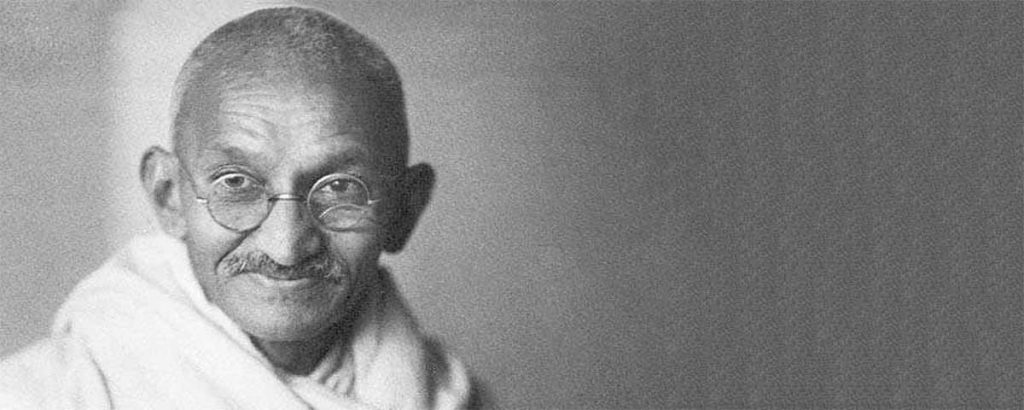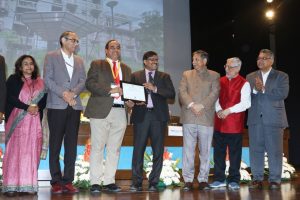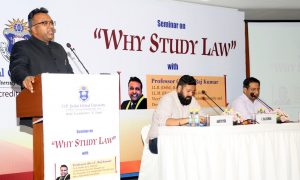
Mahatma Gandhi’s ideas for the pursuit of peace through the practice of truth, non-violence, compassion and kindness were underscored once again during the ‘World Youth Conference on Kindness’ at the O.P. Jindal Global University (JGU) in Sonipat, Haryana.
The Conference brought together many young leaders, and experts from around the world to draw from Gandhi’s ideas of nonviolence to transform their societies towards sustainable peace. As an Institutional partner for the conference, JGU hosted over 100 youth leaders from across the world for 3 days for an international workshop.

Delivering the opening remarks at the inaugural ceremony of the global conference, Professor (Dr.) C Raj Kumar, Founding Vice Chancellor, O.P. Jindal Global University (JGU) articulated the importance of Gandhi’s ideas of peace, kindness, truth, and nonviolence as the revolutionary anchors needed for transforming societies towards sustainable peace. “Gandhi is an undying reminder of how one person can inspire a community, a nation, and the world. His learnings, need to be built into our education systems and exemplified in our daily lives, if real societal change is to be achieved,” he noted.
A Rhodes Scholar at Oxford, a Landon Gammon Fellow and James Souverine Gallo Memorial Scholar at Harvard, Professor Kumar has been deeply inspired by the extraordinary life, compassionate and the far reaching work of Mahatma Gandhi.
He also drew an interesting comparison of kindness with the concept of Ubuntu, a traditional African philosophy that preaches ‘I am what I am because of who we all are.’ Signifying that there exists a common bond between all of us as humanity and it is through this bond, through our interaction with our fellow human beings, that we discover our own human qualities. The philosophy of Ubuntu is the only hope for humanity. “We only affirm our humanity when we acknowledge that of others. It is the quality of Ubuntu which gives people resilience, and enables them to survive and emerge as stronger human beings despite all efforts to dehumanize them. Gandhi knew it and was always conscious of it. The concept of Ubuntu epitomizes the theme of today’s conference on kindness,” he said.

The Vice Chancellor was also cognizant of the fact that at times we all are confronted with attitudes and perspectives that are fundamentally antithetic to kindness. Despite a sense of helplessness and at times, even hopelessness, it is in these moments of despair that one needs to be reminded of the prophetic words of Nelson Mandela who said: “I am fundamentally an optimist. Whether that comes from nature or nurture, I cannot say. Part of being optimistic is keeping one’s head pointed toward the sun, one’s feet moving forward. There were many dark moments when my faith in humanity was sorely tested, but I would not and could not give myself up to despair, as that way lay defeat and death.”
Mandela spent 27 years in prison of which 18 years were spent in Robben Island. He was confined to a small cell, the floor was his bed, a bucket for a toilet, and he was all along forced to do hard labor in a quarry. He was allowed one visitor a year for 30 minutes only. He could write and receive one letter every six months. But Robben Island became his destiny which transformed him. Through his extraordinary intelligence, and dignified defiance, Mandela eventually bent even the most brutal prison officials to his will, assumed a sense of leadership over his jailed comrades and became the master of his own prison.
Mandela came out of the prison as a mature leader who would fight and win the great political battles that would create a new democratic South Africa. But his greatness is his ability to forgive the people who caused him immense pain and suffering. As he left his jail after confinement for nearly three decades, he said: “As I walked out the door toward the gate that would lead to my freedom, I knew if I didn’t leave my bitteress and hatred behind, I’d still be in prison.”
“Mandela embodied all notions of kindness, forgiveness and empathy that we can’t imagine. Here is a man, who without any qualms, simply forgave the people who imprisoned him for three decades”. It is easy to get upset over petty matters in our lives, or become angry with the people who might have hurt us in some way or the other, but such emotions are futile as they chain us into a shackle and take us away from our inner peace, noted Professor Kumar.
Dr. Kumar also expressed concern over prevailing trends of institutionalized violence, discrimination and bigotry, “We are living in a world of institutionalized violence, where discrimination and bigotry is not only tolerated, but at times even celebrated. We are also entering into a society where many of our established norms, values and practices related to non-violence or kindness are either ridiculed or dismissed.” he said.
However, he was optimistic and expressed faith in the younger generation that they’ll be able to dauntlessly confront the large set of dehumanizing values and see the kindness in everything around. “I hope you are able to confront the large set of dehumanizing values and are able to recognize the sense of kindness that is there in all of us.” he said.
The three-day international workshop on social and emotional learning based on the theme of kindness was co-organized by JGU and UNESCO Mahatma Gandhi Institute of Education for Peace and Sustainable Development (MGIEP).
In his closing remarks, Professor Kumar quoted Kent Keith’s poem, ‘Anyway – The Paradoxical Commandments,’ which have inspired millions of individuals across the world:
People are illogical, unreasonable, and self-centered.
Love them anyway.
If you do good, people will accuse you of selfish ulterior motives.
Do good anyway.
If you are successful, you will win false friends and true enemies.
Succeed anyway.
The good you do today will be forgotten tomorrow.
Do good anyway.
Honesty and frankness make you vulnerable.
Be honest and frank anyway.
The biggest men and women with the biggest ideas can be shot down by the smallest men and women with the smallest minds.
Think big anyway.
People favor underdogs but follow only top dogs.
Fight for a few underdogs anyway.
What you spend years building may be destroyed overnight.
Build anyway.
People really need help but may attack you if you do help them.
Help people anyway.
Give the world the best you have and you’ll get kicked in the teeth.
Give the world the best you have anyway.”


